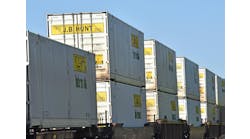Not that there’s anything wrong with having fun; however, people in the conference-producing business have learned some hard lessons of late. If a company is going to spend money sending people to seminars and trade shows, the education component had better be higher than the fun-in-the-sun component.
As a function of my job, I attend a lot of conferences. Few have provided a higher education component than the recently held Reusables for a Better America, sponsored by the Reusable Pallet and Container Coalition (RPCC).
The packaging community has learned a simple, yet complicated, lesson: environmental sensibility doesn’t sell. That’s the truth in consumer packaging and industrial packaging alike. Public responsibility was put on the shelf about the time Ben & Jerry’s dropped Rainforest Crunch from its ice cream lineup.
The RPCC is out to belie the idea that recycling and reuse are ideas from the last century and we should get on with using all the natural resources we have — as fast as we can. Currently, the RPCC is kind of a guerrilla movement. It’s been around for about four years and has a paid staff so small it can hold meetings in VW Beetle. Most people have never heard of this association, yet thousands, possibly millions of people have benefited from its efforts.
The 22 corporate members are from the top of the current crop of container and pallet manufacturers. The association makes a point of being material-neutral. It emphasizes the reusable aspect of its mission. At its Dallas educational conference were folks from the plastic container world, along with wood product manufacturers and metal-goods makers. There was also a solid lineup of transport packaging users in attendance.
To date, RPCC has focused its efforts on legislative matters and establishing standards. It has alliances with other associations of makers and users of pallets and containers.
Among its victories has been the elimination of sales tax on the purchase and lease of returnable containers and pallets in California, Florida, Colorado and Delaware. It has also established best practices guidelines for the use of returnables in the produce industry.
The nation’s governors have in the past encouraged reusable products as a means to reducing solid waste. The previous policy called for recycling 40 percent of the nation’s waste by 2000. Old news. The new policy is more ambitious and calls for a 50 percent waste reduction through reuse and recycling by 2010. The RPCC has shown its support for this new policy.
A couple of years ago the association backed the Reusable Plastic Container & Pallet Association’s (a product section of Material Handling Industry of America) burn test initiative of plastic pallets. The effort generally validated existing fire protection standards when using plastic pallets. It also negated some of the more restrictive proposed changes to the protection standards.
And here’s where guerrilla fighting is at its best, winning the hearts and minds of the indigenous people. RPCC launched a campaign in cooperation with the Solid Waste Management Coordinating Board Reduction and Recycling Committee in the Twin Cities area of Minnesota. A study of solid waste in that six-county region indicated about 15 percent of the solid waste in the landfills was corrugated containers and wood pallets.
A grass-roots educational program (RPCC supported) kicked off to businesses in 2001 was gimmicky; however, it got the point across. Educational workshops, including presentations from the RPCC, brought home the message about the mess age
: Technology benefits and cost-savings benefits of reusable transport packaging make recycling a reality.
As Victoria Reinhart of the Ramsey County (Minnesota) board of commissioners told me, government has to stay ahead of the curve. “Government can’t solve these problems on its own,” she said, “but it can provide direction and cooperation.”
As I listened to Ramsey’s message I thought how contrary it ran to the message we, as consumers, receive daily. From the get-go we’re taught to consume. Now, as managers dealing with transport packaging, the manifesto has to be, reuse. People won’t believe the story just because you tell them. You have to act. You have to choose to do the right thing. It doesn’t just happen. Yeah, I know, it’s still about making money. Now it makes sense because it makes cents.
Clyde E. Witt, [email protected]


